A Letter from Javits
A Letter from Javits
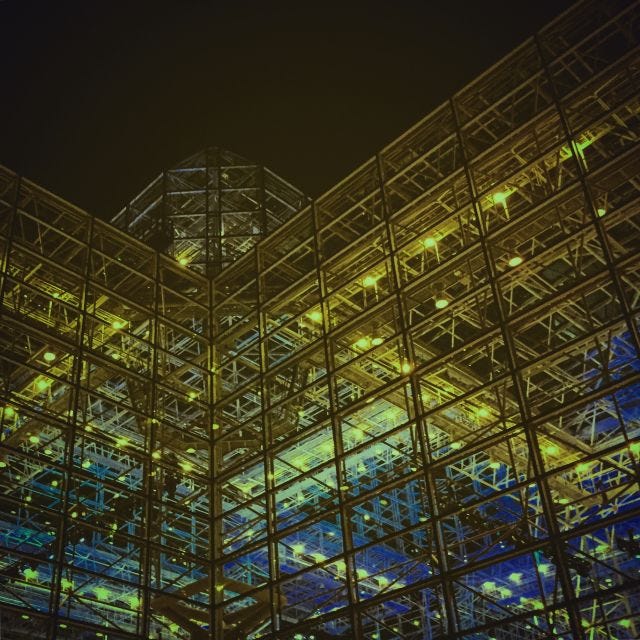
The crowd in the cattle pens outside of Hillary Clinton’s election night victory party was about to lose control.
A few thousand people were jammed between metal fences that lined 11th Avenue. Everyone wanted to get closer in, or farther out, and so they squeezed around each other until they couldn’t squeeze any more, and then they turned around and squeezed their way back. Everyone pushed. A girl screamed. It felt like the scene was about to go very bad.
It was 7:00 P.M., and Clinton was still winning.
I spent the last hours of the Clinton campaign at the Javits Center, where the media and some excited New Yorkers had gathered to watch the next president's anointment. It was a strange, blurry way to watch the world change. Up close, the night that Donald Trump was elected president felt like something that was happening far away, in slow motion.
In retrospect, all sorts of things about last Tuesday seem like warning signs: How every voter I stopped leaving the polling site at the Park Slope library that morning said they were frightened. How all the Cobble Hill yuppies taking selfies at the intersection of Clinton Street and President Street had their fingers crossed in prayer. How the subways seemed to take forever to show up. How the sky was perfectly clear.
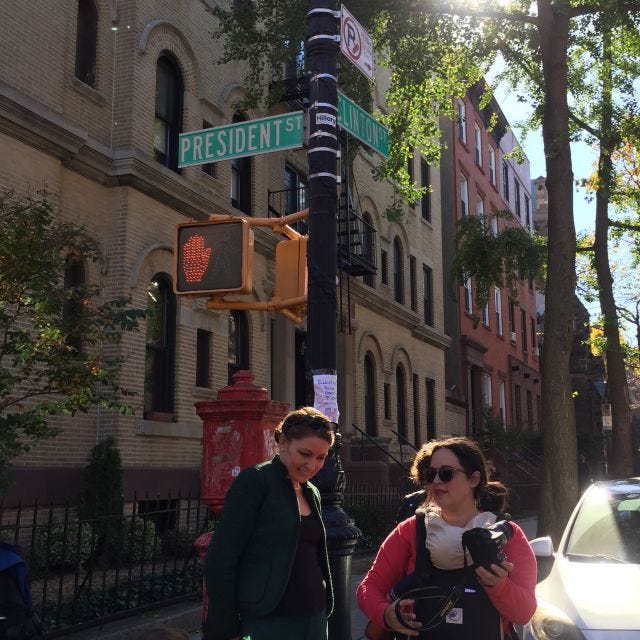
The brightest warning sign of them all, though, should have been the utter misery of that overflow pen outside the Javits Center. The thick, angry crowd. The stubborn police. It didn’t look like the setting for a victory party. It looked like a Rolling Stones concert right before the Hells Angels show up.
I cleared the security line at the Javits Center just before 5. A squad of those heavy cops with the big assault rifles were clicking their weapons together near the press entrance, and there were Secret Service dogs and metal detectors and more guys watching from the roof.
Inside, things felt calm. The media filing center was in a tremendous hall in the basement; 150 yards long, say, and 50 wide. The big networks had their own rooms off to the side, and for everyone else there were rows and rows and rows of tables, each spot reserved for a different outlet: The Daily Beast, Mother Jones, El Pais, Mic, The Jewish Daily Forward (that’s me!), & etc. There were famous journalists (Jill Abramson, Halperin and Heilemann), Twitter-famous journalists (@bendreyfuss), and plain old famous people (Robert Smigel, Debra Messing). Everyone was staring at their laptops, or watching the big projection screens that flipped between ABC and CNN and MSNBC. Foreign TV reporters were standing in the aisles talking to anchors back home, so you crossed television screens in fifteen nations on your way to the bathroom.
It was exciting to be at the center of the action, but it became clear within a couple of seconds that there wasn’t actually much action to be in the center of. It would be seven or so hours until Clinton gave her acceptance speech, and there was nothing to do in the Javits Center. Most press wasn't allowed to leave the basement. Only media with special green tags could go upstairs to the glass-ceilinged hall where Clinton was supposed to speak. I was allowed to go to the food court, my desk, or outside. So I went outside.
I got to the cattle pens around 5:30, just as the unseen hands managing the evening began to let the crowd into the stretch of 11th Avenue blocked off for their pleasure. There were food trucks and port-o-potties at one end, and a tiny stage at the other. The crowd hustled for spots by the stage, and then looked around, confused. What was this? Were they really not getting inside? They were annoyed, and my press pass looked a bit like a staff badge, so they started coming up to me with questions: Why was the stage so small? Why was it pointed in the wrong direction? I didn’t know, and I said as much. One guy berated me first for not knowing, and then again for not having a business card with me. He seemed nice.
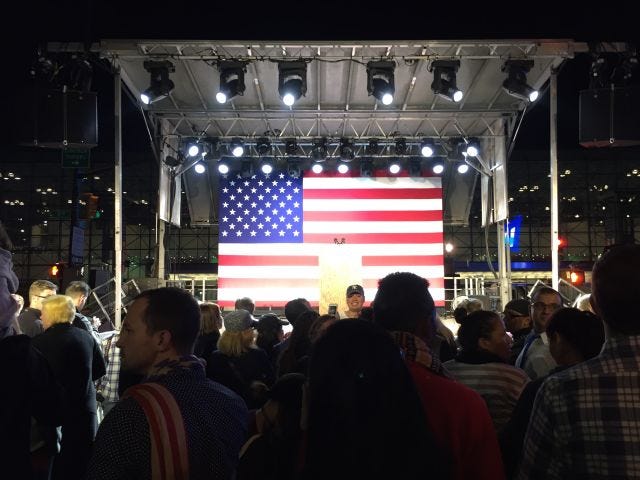
One tricky thing about covering events like this for the Forward is that you generally want to find Jews to talk with, and Jews can be hard to spot. You feel like a Lubavitcher with Shabbat candles: Are you Jewish? Are you Jewish? It feels gross, but it’s my job, so I asked as nicely as I could. In Park Slope earlier that day, nearly everyone I had stopped said they were Jewish, which was surprising. At the Javits Center, almost no one was Jewish, which was also surprising. I interviewed them anyway, and they told me that they were there to witness history. They told me that when Clinton won, it would ease the sting they still felt from when the Equal Rights Amendment failed 35 years ago. They told me about the letter they sent to their elementary school newspaper in 5th Grade, demanding that girls be allowed to wear pants. They told me that they had been waiting a long time for this.
When I tried to get back to my laptop in the Javits Center basement to write it all up, I found out that, despite the assertions of various important-seeming people, my press pass lacked the influence necessary to get me out of the cattle pen and back into the building. After ineffectually waving my pass for a while, and engaging in circular conversations with a number of cops, and getting shoved a bit too hard by the crowd, I decided to bail.
I left the cattle pen and jogged over to 10th Avenue, which was bustling. With a thousand reporters safely locked in a basement in a militarized convention center, it turned out the action had shifted a block to the east. I saw the guy who played Toby on West Wing, and then I saw where he seemed to be coming from: There was a party in some kind of gallery, the crowd bathed in a blue glow. Just inside was John Podesta, the owner of the most-read email inbox in American history. Podesta was saying his goodbyes, with smiling men stopping him every three feet for a handshake. I waited my turn. When he passed me, I introduced myself and asked something anodyne: How’s it going, I think it was. Podesta turned away, then registered that I had lobbed him a big fat softball, and turned to answer. It’s going good, he told me. “We’re feeling like we’re going to win this thing.”
They didn’t win that thing. It was another hour and a half until I started wondering if Podesta had his feelings mixed up, and it was not until nearly 3:00 in the morning, when I was home and somehow still awake, that I was sure.
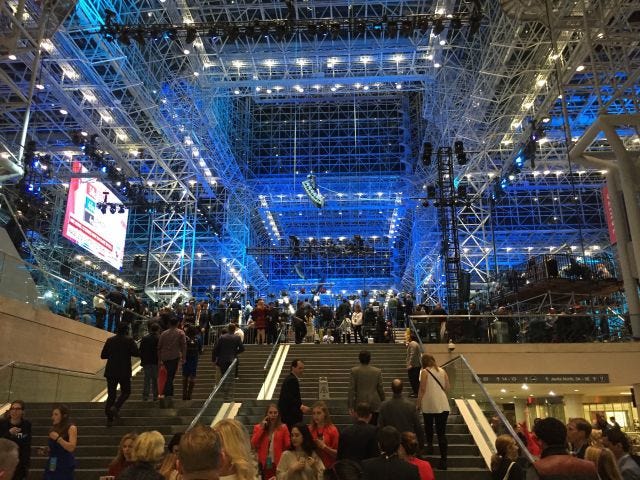
The next few hours are an unreal jumble in my memory.
I talked to Podesta around 7:40. I got back to my post at the long filing center table just before 8. I’d written my first story by 8:20 and my second by around 9:00. In the hour I spent writing, things started to shift. Florida and New Hampshire were looking tight; Republicans were winning Senate seats; and the Democrats on cable news were getting a funny look in their eye. I missed all that. I was drilled in on my story, and I was ignoring the big projection screens, and as far as I was concerned, Podesta’s line still held: They were gonna win this thing.
My stories done, I looked at the Times website. I then wrote the following message to my editor: “does it...look...like...trump may win????” This was at 9:10. I stood up to stretch and buy a soda.
I know I had begun considering the possibility that Podesta had been wrong, but I also know that I hadn’t begun to consider the implications, because when I ran into a colleague on the line in the food court, I was entirely unprepared for his mood.
I was happy to see him. The colleague, who writes opinion, was bereft. It’s over, he said. Trump’s going to win.
I didn’t believe it, exactly, but I did recognize that things were getting weird in the Javits Center. The crowd upstairs, which had roared on and off while I was writing, had gone quiet. A security guard was praying. There seemed to be a run on beer in the food court.
The filing center itself was more reserved. People were watching TV, arms folded. I went upstairs, sneaking through the food court and up an escalator to an indoor bit of the Javits Center where I technically wasn’t supposed to be. Katy Perry was just finishing a speech, and the sound system started playing one of her upbeat songs, but you could tell that the crowd didn’t want to hear it.
“I’m getting deported in 5, 4, 3, 2…” someone standing near me said.
I wrote another story, then left the filing center to roam some more. I passed a guy saying he felt like he would vomit. I ran into a Jewish Democratic big-shot heading home, distraught. He smiled for the picture I took to illustrate my story. Instinct, maybe. Outside, the crowd was still huge, but they had gone quiet, staring up at the big screen, just watching.
The rest of the night is a blur. It seemed to get brighter and brighter inside the windowless basement. Whoever was controlling the television feed settled ABC. I wrote a story about the big-shot telling me that he felt as though a foot had gone all the way through his stomach. An in-house video played over the projection screens, ending in a chant that went: “I believe that she will win.” Back upstairs, the hall was emptying out. There was disbelief, and there was despair, and there was a twinge, too, of fear. People were hugging each other and crying.
“It’s surprising as hell,” someone told me. “It just doesn’t make any sense.”
I went back downstairs and wrote about that, too.
There was something about this routine of getting quotes upstairs, where things were going to hell, and then running down to the surreal quiet of the filing center to write, that made it feel not real. As the hour got impossibly late, and I got a little loopy, it started to feel like the election was something that was happening to other people upstairs, and my place was in the basement, typing.
At 1:45 A.M., the projection screens stopped showing the news. I started to think about leaving. At 2:00, Podesta reemerged onstage upstairs. He seemed uneasy. “Listen, listen to me,” he said. “Everybody should, ah, head home, you should get some sleep, we’ll have more to say tomorrow.”
So we left. The crowd walked slowly east, away from the river, chewing over what Podesta had said. Was it over? Was it not over? It was obviously over. So why had Podesta sent everyone home? Why no concession? Maybe it wasn’t over?
At the end of the police barricade, there was a man with a cardboard sign offering hugs. No one took him up on it.
In the taxicab home, 1010 WINS said that Clinton had called Trump to concede. The cab driver said it had been over for a while. The television news and Twitter concurred. The basement of the Javits Center, it turned out, had been a kind of time warp.
When I got home, Trump was about to deliver his acceptance speech. I caught up fast.
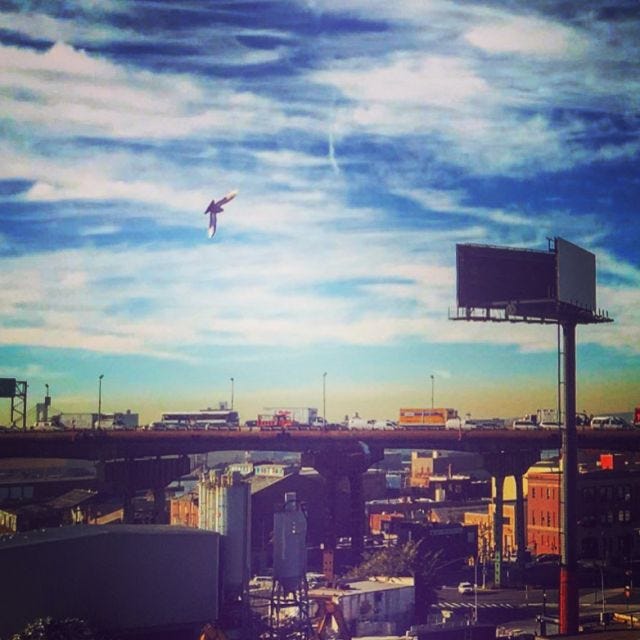
Here are some things I wrote on election day, and since:
Jewish groups balance collaboration and resistance with Trump administration.
The scene at the Javits Center as things started to get grim, and then again after midnight.
Some tweets about Clinton, Trump, and political roundtable podcasts.
A Republican Jewish official wants an "examination" of the Anti-Defamation League for its work during the campaign.
Women outside Clinton event wait, and hope.
The scene at President & Clinton.

